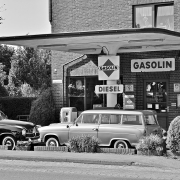What caused the 1980s Third World Debt Crisis?
What happened during the Third World Debt Crisis of the 1980s?
In the 1970s, developing nations were in need of financial support to carry out their economic development. As such, the governments took loans from international banks and developed nations. However, poor resource management resulted in the accumulation of debts, which was worsened by external factors like petrodollar recycling. By 1985, the total external debt rose to $1,017 billion, causing severe disruption to the international banking system.
Topic of Study [For H2 History Students]:
Paper 1: Understanding the Global Economy (1945-2000)
Section B: Essay Writing
Theme II Chapter 2: Reasons for problems of the global economy
In the following sections, we will look at the contributing factors of the Third World Debt Crisis and its consequences on the global economy. This case study is crucial as students are expected to be weigh the significance of the Debt Crisis, with respect to other factors like the Oil Crisis of the 1970s and trade protectionism.
1. [OPEC] Cause #1: Petrodollar Recycling
One of the major contributing factors of the Third World Debt Crisis was related to twin oil shocks in 1973 and 1979. The OPEC (Organization of Petroleum Exporting Countries) profited tremendously from the artificial oil shortage, thus accumulating ‘petrodollars’. With these excess profits, the OPEC members invested in international banks. Subsequently, these banks lent money to developing countries.
However, as these developing nations accepted loans to purchase raw materials and oil to facilitate economic development, the external shocks in the global market led to the expansion of foreign debts.
2. [USA] Cause #2: Volcker Shock
The second contributing factor relates to the US government’s response to the high inflation rates that plagued their economy. The Chairman of the Federal Reserve, Paul Volcker, proposed the increase in interest rates to combat the double-digital inflation caused by the 1979 oil shock.
The Federal Reserve hiked its interest rates from 10.25% to 20% by March 1980. Consequently, higher interest rates led to higher costs of loan repayments for borrowers. For example, the total interest payment for Latin American countries increased by 360% from 1978 to 1983.
3. [Third World Nations] Cause #3: Mismanagement of Loans
Internally, it can be argued that some of these debtor nations were ineffective in managing their loans. In particular, the money was used for other purposes, besides economic development. For instance, inept leaders diverted the loans to the purchase of military equipment.
Besides, a large proportion of the loans were used to purchase oil and inflated prices. As a result of the interest rate hike (as discussed earlier), loans were also used to finance interest payments. Hence, it is clear that some of these nations were unable to repay their loans.
4. [Third World Nations] Consequence #1: Economic slowdown
In view of the debt accumulation, one significant impact is the slowdown in economic growth for debtor nations. Governments were unable to focus on economic development as they lacked the finances to function. Furthermore, Third World nations experienced a decline in living standards as many citizens suffered from extreme poverty.
Latin American countries, such as Mexico and Brazil, defaulted on loans, which caused severe disruption to the international financial system. For example, Mexico declared its inability to finance the loans in Aug 1982, which caused a cascading effect on other neighbouring countries.
5. [IMF] Consequence #2: Washington Consensus and SAPs
As such, these countries turned to the International Monetary Fund (IMF) for solutions, such as debt re-scheduling or even cancellation. the IMF proposed a ‘bailout’ strategy, which was known as the ‘Structural Adjustment Programmes’ (SAPs).
To ensure these debtor nations are committed to the repayment of loans, the IMF imposed a set of strict conditions before loans were handed to them (i.e. Neo-Liberalism). In short, countries must adopt a policy of macroeconomic stabilization, trade liberalization and privatization.
Contrary to IMF’s expectations, the bailout was more of a hindrance than help to the indebted countries. For example, governments were forced to cut spending (i.e. austerity measures) to reduce debt. Yet, this meant that less subsidies were given to keep the price of necessities low, thereby resulting in higher cost of living. Eventually, the aim of debt reduction was not achieved.
Note to students: In fact, this IMF ‘bail-out package’ was accepted by some of the Southeast Asian governments during the 1997 Asian Financial Crisis (Paper 2 Theme II topic), which also created problems for their economies.
What can we learn from this case study?
Consider the following questions to understand this economic issue:
– How far do you agree the debt crisis of the 1980s was more severe than the oil shocks of the 1970s? [to be discussed in class]
Following the thorough analysis of the Third World Debt Crisis, it is imperative to apply your newfound knowledge to practice questions. Sign up for our JC History Tuition and learn to form cohesive and persuasive arguments that answer a wide range of A Level History essay questions effectively.
The H2 and H1 History Tuition feature online discussion and writing practices to enhance your knowledge application skills. Get useful study notes and clarify your doubts on the subject with the tutor. You can also follow our Telegram Channel to get useful updates.
We have other JC tuition classes, such as JC Math Tuition and JC Chemistry Tuition. For Secondary Tuition, we provide Secondary English Tuition, Secondary Math tuition, Secondary Chemistry Tuition, Social Studies Tuition, Geography, History Tuition and Secondary Economics Tuition. For Primary Tuition, we have Primary English, Math and Science Tuition. Call 9658 5789 to find out more.


